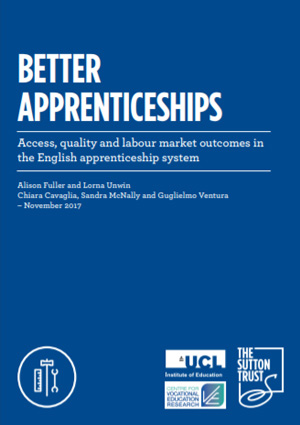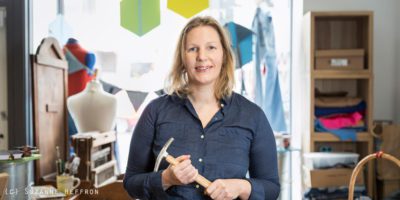Javneet Ghuman joined the Sutton Trust and the Education Endowment Foundation in 2016. She previously worked for an older people’s charity as their public affairs lead, and for a former Minister during the Coalition Government. She holds a history degree from the London School of Economics.

“…apprenticeships should not be thought of as equal to each other with regard to future earnings. There needs to be a greater effort to attract women to sectors such as engineering where they are unrepresented, despite high potential returns…”
Improving social mobility in the UK
Low social mobility and lack of educational opportunity is arguably the biggest social challenge of our times: the income gap between the richest and poorest in society continues to widen, while education opportunities remain overwhelmingly dominated by children from the most privileged homes.
The Sutton Trust was founded by Sir Peter Lampl in 1997 to change this. We’re a foundation which improves social mobility in the UK through evidence-based programmes, research and policy advocacy.
From early years’ through school, college and university to the workplace, we work to combat educational inequality and prevent the subsequent waste of talent. We are concerned with breaking the link between educational opportunities and family background, so that young people are given the chance to fulfil their potential, regardless of their family background, school or where they live.
As disadvantage starts before young people are born and continues through to the workplace, our research covers parenting and early years projects, primary and secondary schooling, access to university and the professions, and apprenticeships. Our programmes are designed to inspire and support students from low-income homes to make informed decisions about their next steps.
Better Apprenticeships research
Good quality apprenticeships have the potential to be important vehicles for social mobility. With lifetime earnings on average better than many degree courses, apprenticeships offer the opportunity to ‘earn while you learn’, gain marketplace value skills and a foot on the career ladder.
We wanted to find out what types of apprenticeships lead to the best salaries, as well as if there’s a gender imbalance between the sorts of apprenticeships young people are taking. We commissioned teams from the UCL Institute of Education and the Centre for Vocational Education Research at LSE to analyse the current state of play for apprenticeships in England.
Headline findings

Stark gender difference in earnings for apprentices
The report also highlighted a stark gender difference in earnings for apprentices. We found that, by the time they are 28, men who take a Level 3 apprenticeship might expect to earn up to 37% more than their peers who left education with A-levels. However, the figure for women is just 9%. Overall, the earnings difference for those with apprenticeships is almost four times larger for men than for women.
This is largely due to the types of apprenticeships that men and women go into. Men are concentrated in higher-earning sectors like engineering, building and construction, while women are more likely to take apprenticeships in lower-earning sectors like hairdressing and childcare.
‘Better Apprenticeships’ reveals earnings payoffs for men from apprenticeships are up to four times more than for women https://t.co/JT37KcLjNK pic.twitter.com/fDjocOcogq
— The Sutton Trust (@suttontrust) December 3, 2017
Addressing gender imbalance
Tackling the gender imbalance in apprenticeships is crucial for making sure apprenticeships fulfil their social mobility promise. We need to see better careers advice for young people in school that tackles gender segregation and takes into account the benefits of apprenticeships as a route to labour market recognition and educational progression.
However, apprenticeships should not be thought of as equal to each other with regard to future earnings. There needs to be a greater effort to attract women to sectors such as engineering where they are unrepresented, despite high potential returns.
Supporting our work
The Sutton Trust has just launched a campaign to harness apprenticeships as a driver of social mobility. We want to see more high-quality apprenticeships that offer real progression for young people.
The Womanthology community can find out more about the campaign and sign up to stay informed on this page. Readers can follow us on Twitter to stay informed too.
https://twitter.com/suttontrust
https://www.facebook.com/suttontrust





